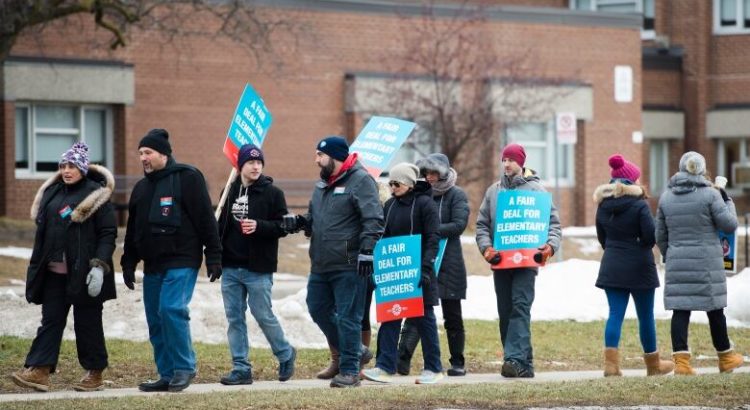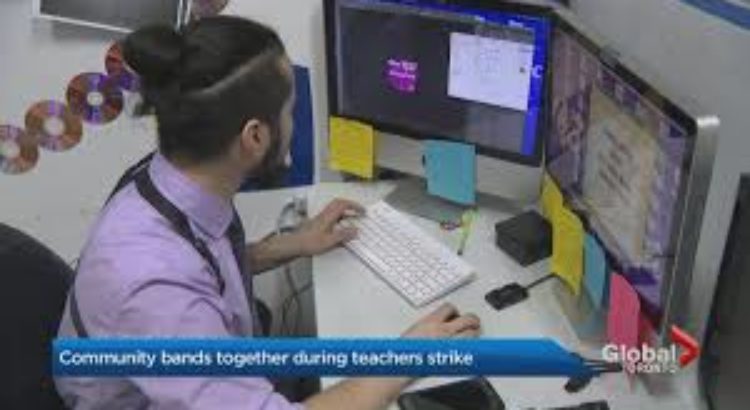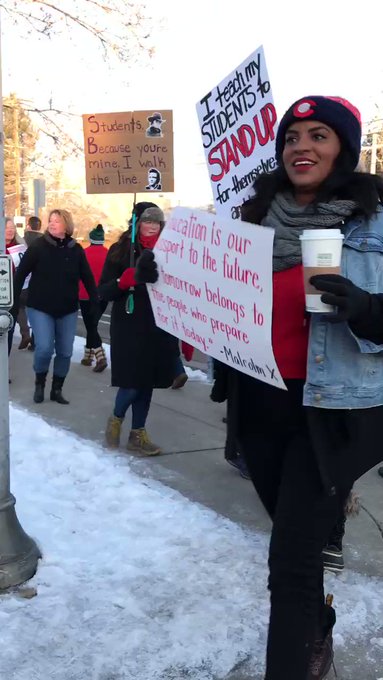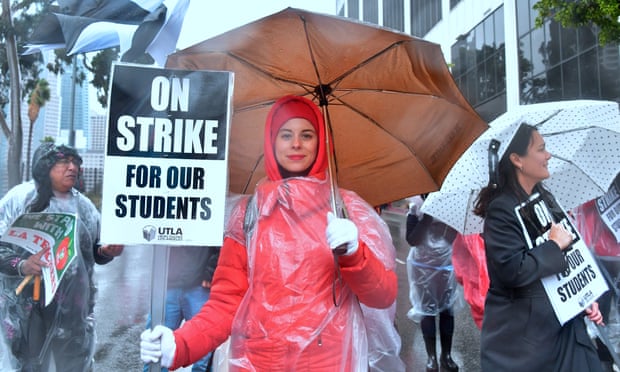North America/ Estados Unidos/ 11.02.2019/ By: Michael Sainato/ Source: www.theguardian.com.
Colorado city educators would be the latest in a broad wave of strikes and protests across the country battling for funding
School teachers in Denver, Colorado, are set to strike on Monday in the latest of a wave of actions that has swept the sector in the past year as educators battle for better pay and working conditions.
In Denver, teacher salaries have been steadily decreasing, leading to high turnover in the district. Teachers are forced to financially rely on bonuses and incentives beyond their control as part of a system called ProComp, first enacted in 2005.
“The bonuses and the amounts change every year. This has led to a problem where teacher salaries are different every year, and teachers, including myself, have been getting paid less every year,” said Michelle Garrison, a teacher at Farrell B Howell Early Childhood Education-8th grade school “You don’t ever get a paycheck that’s the same. It makes it hard for budgeting.”
Tanessa Wilson, a teacher at John H Amesse Elementary in Denver cited an example that teachers at her school missed out on a $1,500 bonus this year because students who receive free and reduced lunches decreased by 0.2%.
“These incentives are based on factors that are out of our control and we don’t think that is fair,” said Wilson.
Some 93% of the Denver Classroom Teachers Association membership voted to authorize a strike last month in the midst of new contract negotiations.
“The current model isn’t working for teachers, it isn’t working for students,” said Nik Arnoldi, a teacher at Escalante-Biggs Academy.
Denver Public Schools officials responded to the strike vote by formally requesting the state of Colorado to intervene to avoid a strike, but the state declined.
“To our teachers: We want and need you in our classrooms,” said Susana Cordova, district superintendent, in a statement. “We want to work to reach an agreement and we welcome support from Governor [Jared] Polis and his administration to bring us both back to negotiate.”
A spokesperson for the district added: “The school district is committed to keeping schools open and on normal schedules during a strike to support our students and their education.”
Teachers in Oakland and Sacramento in California are also potentially heading toward strikes in coming weeks as part of a broader wave of actions that occurred in several states and cities in 2018. Those strikes led to significant victories for teachers in Oklahoma, West Virginia, Arizona, and, most recently, Los Angeles.
The American Federation of Teachers president, Randi Weingarten, said these walkouts are part of a broader trend of teachers combatting decade-long systematic funding problems in public education.
“No teacher wants to go on strike, but these actions are a direct response to the austerity politics that have left public schools low on the budget priority list in far too many states,” said Weingarten. “Our communities have made clear that they want safe, strong public schools, where kids can learn and where teachers can teach. When educators walk out, they’re doing it to get what their kids need, and they’re using the power of their collective voices to fight for the resources that are necessary to make schools better.”
The decline in teacher pay has been a significant public policy issue highlighted in these waves of strikes and protests. A report published by the Economic Policy Institute (EPI) in September 2018 found teacher pay has eroded since the mid-1990’s, with teacher pay penalties – the percentage by which public school teachers are paid less than comparable workers – growing to 18.7% in 2017.
Several states with the highest teacher pay penalties – Arizona, Virginia, Colorado, and Oklahoma – saw teacher walkouts and protests highlighting this increasing pay gap.
“Across the US, teachers and entire communities are saying enough is enough,” said Dr Sylvia Allegretto, co-chair of the Center on Wage and Employment Dynamics at UC Berkeley and lead author of the EPI report.
In Sacramento, teachers are still fighting for resources they won in a November 2017 contract with the Sacramento Unified school district. A strike was narrowly avoided when the teachers union and city reached a contract deal days before a scheduled walkout, but the teachers union says the district has ignored the contract.
“The contract we accomplished with the district not only dealt with economic issues but found resources to lower class sizes, add counselors, early intervention, school nurses, a lot of what they were working on in Los Angeles,” said David Fisher, president of the Sacramento City Teachers Association.
“Since then it’s been an issue with the implementation,” he added.
South of Sacramento, teachers in Oakland, California, voted to authorize a strike amid their contract negotiations. The Oakland Education Association announced on 4 February that 95% of union members voted to authorize a strike, which could occur anytime after 15 February.
“We are fighting for smaller class sizes, living wage, stopping school closures and more student support,” said Quinn Ranahan, a math teacher at Roots International Academy middle school, one of 24 schools in the Oakland Unified school district that are being considered for closure over the next five years.
A spokesperson for the district said in an email: “We are eager to come to an agreement with our teachers union, one that pays teachers what they deserve and that allows them to thrive in the expensive Bay Area. That being said, we have serious budgetary limitations, so we need to come to an agreement that is also sustainable for the district..”
Source of the notice: https://www.theguardian.com/us-news/2019/feb/10/teacher-strikes-denver-education-salaries-funding














 Users Today : 210
Users Today : 210 Total Users : 35459805
Total Users : 35459805 Views Today : 372
Views Today : 372 Total views : 3418344
Total views : 3418344